A Strange Step Backward

by Gideon Marcus
With the round robin review format we've set up for Star Trek, everyone's obligations are pretty small, with the exception of the person assigned the head: the first, summarizing piece of the article. I drew the short straw this week, possibly the most challenging week in the history of this new show.
Because a summary's job is to explain what happened. And in "The Corbomite Maneuver", virtually nothing happened.
Repeatedly.
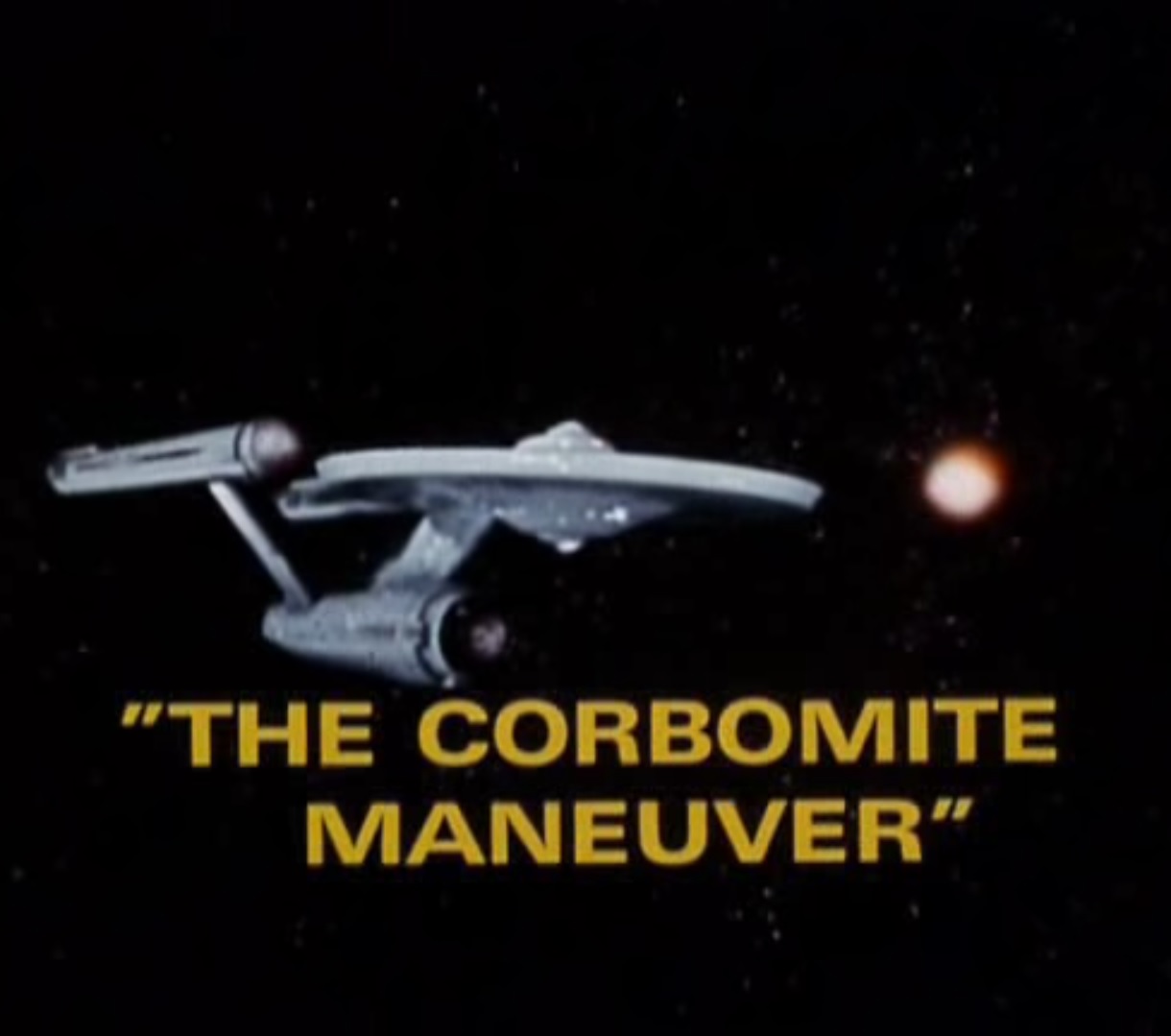
The episode boils down to this: The Enterprise travels into an unexplored area of space. An alien ship intercepts the Earth ship, traps it, and threatens to destroy it. The alien ship takes many guises — first a multicolored cube, then a giant globe of incandescent lights, then a set of glowing soap bubbles (admittedly gorgeous effects), but the scenario is always the same. The Enterprise tries to break free, dramatic music plays, people fall out of their chairs or bounce around in hallways. The navigator-of-the-week, this time a ‘Lieutenant Bailey’ (anxious, overeager, promoted too early) occasionally has a breakdown. Lieutenant Uhura says "Hailing Frequencies open" a half dozen times, looking rather bored.
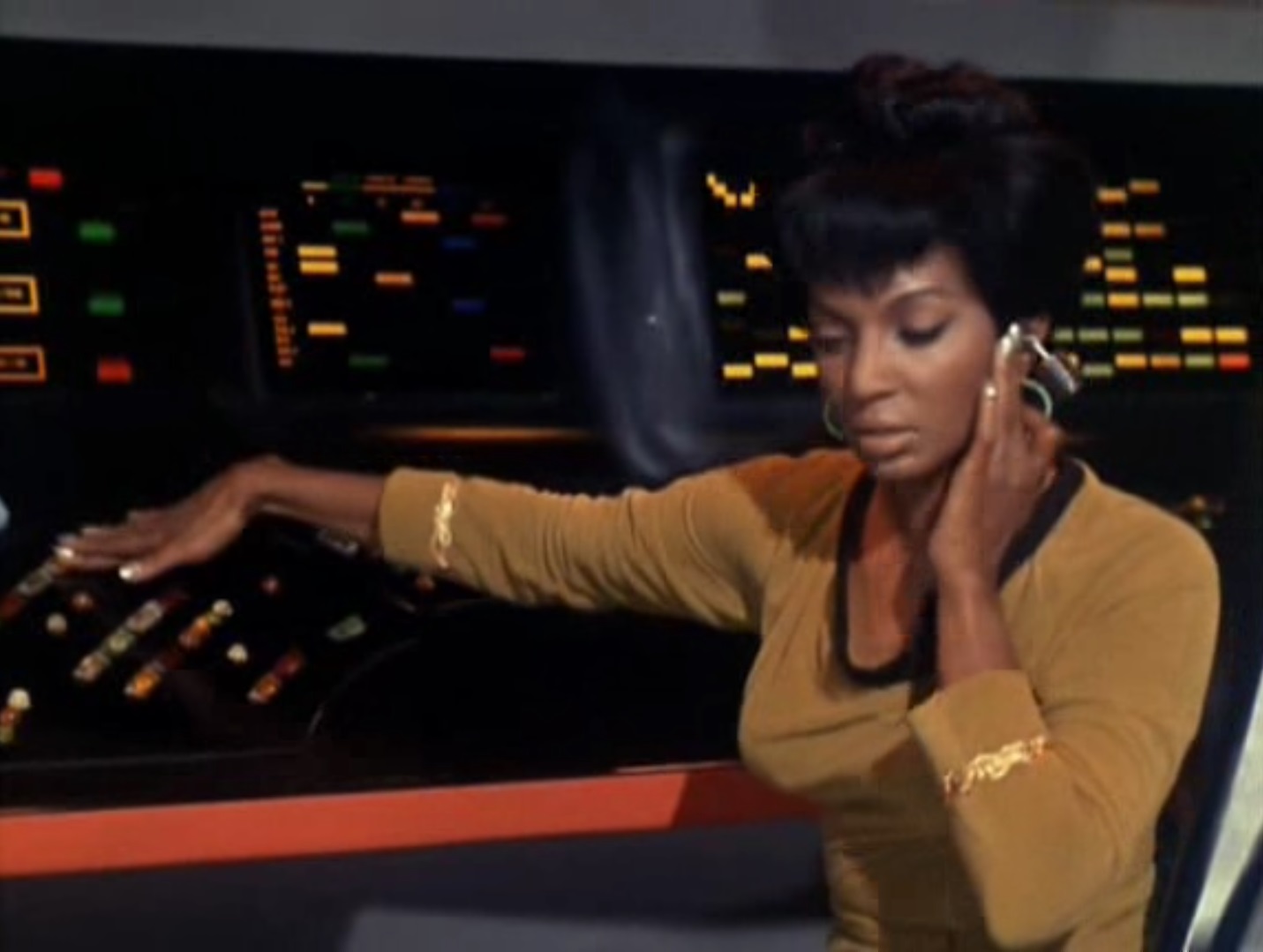
"I should have stayed with Ma Bell…"
Eventually, we learn that the whole thing was a test. The alien, Balok of the First Federation (Ron Howard's little brother), never planned to destroy the Enterprise. On the one hand, I appreciate an episode without a villain, one that challenges the hubris that we are the most powerful or the kindest race in the galaxy.
On the other hand, once we know that Kirk and his crew were never in danger, everything becomes a cheat. The tension, the clever attempts to outmaneuver Balok (with warp engines or poker metaphors), all of it is meaningless.
Add to that a certain unevenness of the episode. It is pretty clear this episode was filmed before the others we've seen in the series. Spock is yelling again, is wearing his old uniform, and his haircut is more severe. Shatner has less of a grip on the Kirk character, playing him on a short fuse. As with "Where No Man has Gone Before", everything feels rawer, cheaper, more like an episode of Voyage to the Bottom of the Sea. Perhaps it was the consciously military mien of the scenario and character interactions.
All this kvetching suggests I didn't like the episode. That's not quite right. There are some great exchanges, particularly any involving DeForest Kelley (Dr. McCoy). George Takei's Sulu is a delight, with a lot of great subtle expressions. Yeoman Rand got an entire episode free of assault (though Kirk resents her existence as a woman). The special effects are really excellent, and probably the reason the episode got delayed.
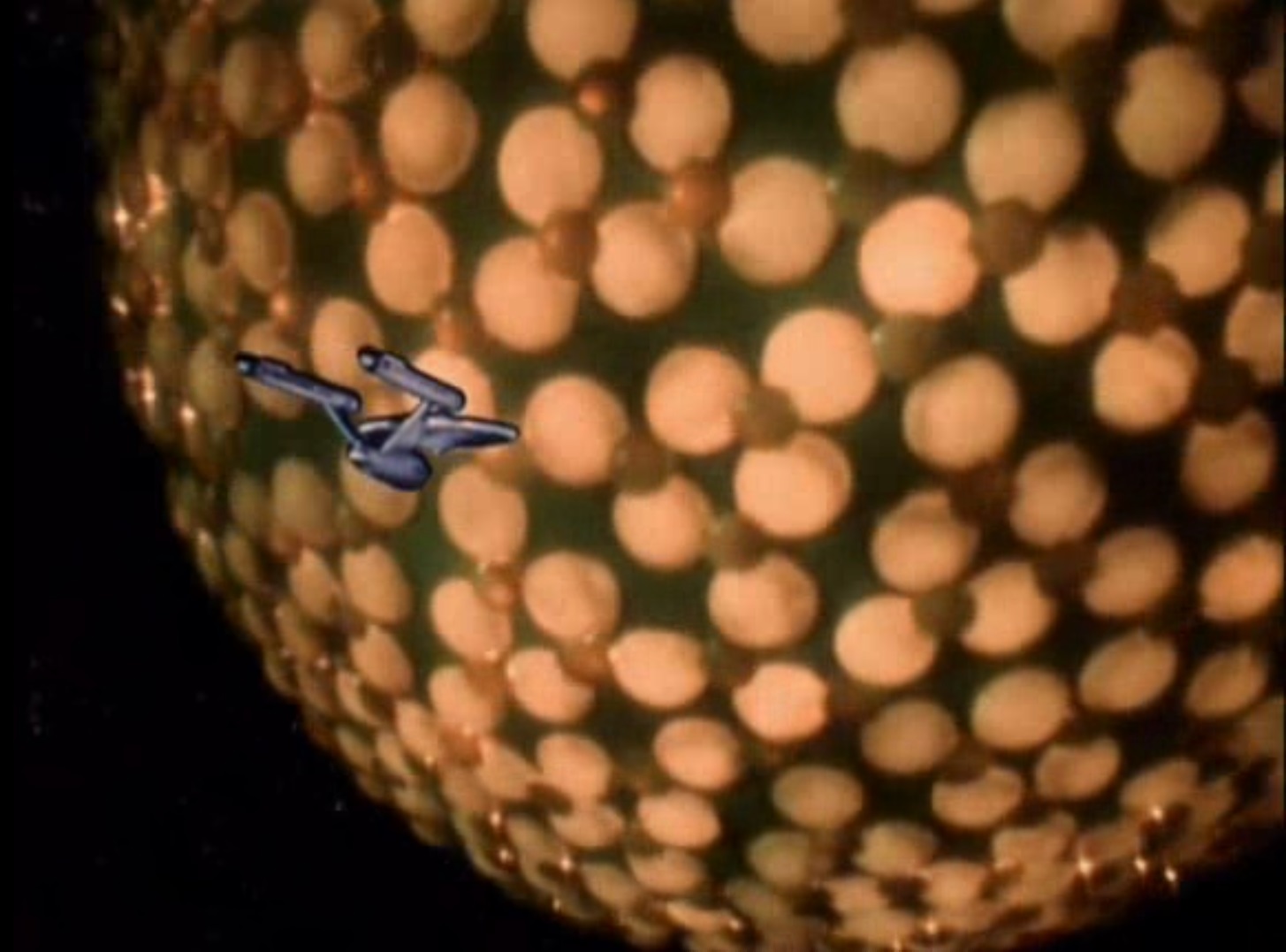
That's a really big Christmas ornament…
But for the most part, I was just kind of bored. That's a new experience for me with Star Trek, which has hitherto been either great or problematic. However, if "Maneuver" really is an early episode, that means we're actually on an upward rather than a downward trend. Plus, next week's episode, which looks like it will incorporate the terrific first pilot, is very promising.
So, three stars, but I won't hold it against the show.
Zero-Sum Game

by Janice L. Newman
As Gideon notes, The Corbomite Maneuver was a, shall we say, uneven episode. The first time the ship was ‘about to be destroyed’ it was exciting. By the third time, it was definitely less impactful. On the other hand, the story had plenty of great moments. The problem was, these ended up undermining each other.
For example, Captain Kirk pulls off a wonderful bluff where he apparently convinces the enemy that destroying their ship will result in the destruction of their own vessel – the bluff being the titular ‘Corbomite Maneuver’. It’s a desperate, brilliant moment that would have made a fantastic climax for the episode. Everything, from Spock saying that it was ‘well-played’, to Bailey returning to the bridge, to Kirk’s sigh of relief when the ship is not destroyed (not to mention McCoy’s overeager offer to teach Spock the game of poker) makes for a great piece of television.
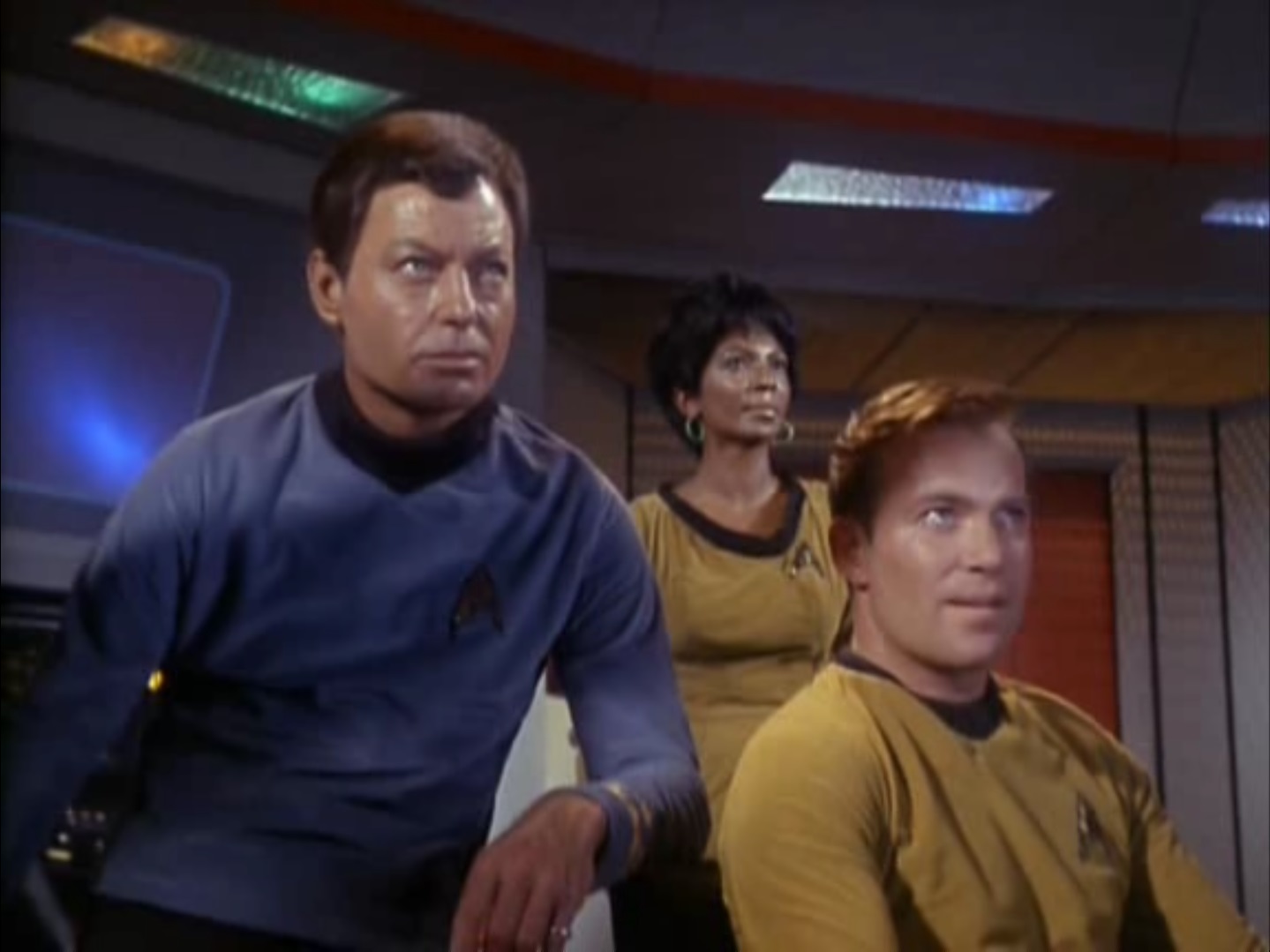
The gambit pays off.
Unfortunately, it’s not the climax of the episode – or rather, it’s the climax, but not the end. And then, when we do reach the end of the story, we learn something which by itself would have made for a clever plot twist. It turns out that the entire set of encounters were orchestrated by a single entity, a powerful being who claims that it was ‘all a test’.
This is something we haven’t seen before. Yes, in Where No Man Has Gone Before and Charlie X we had immensely powerful beings, be they humans or aliens. And in The Cage we did see powerful alien minds manipulating humans to try to get something from them. But we’ve never seen (presumably benevolent) aliens simply ‘testing’ humans to learn their ‘real intentions’. It would have been a great reversal, if only it hadn’t undermined everything which had come before. The clever parts of the story, rather than building on each other, unfortunately canceled each other out.
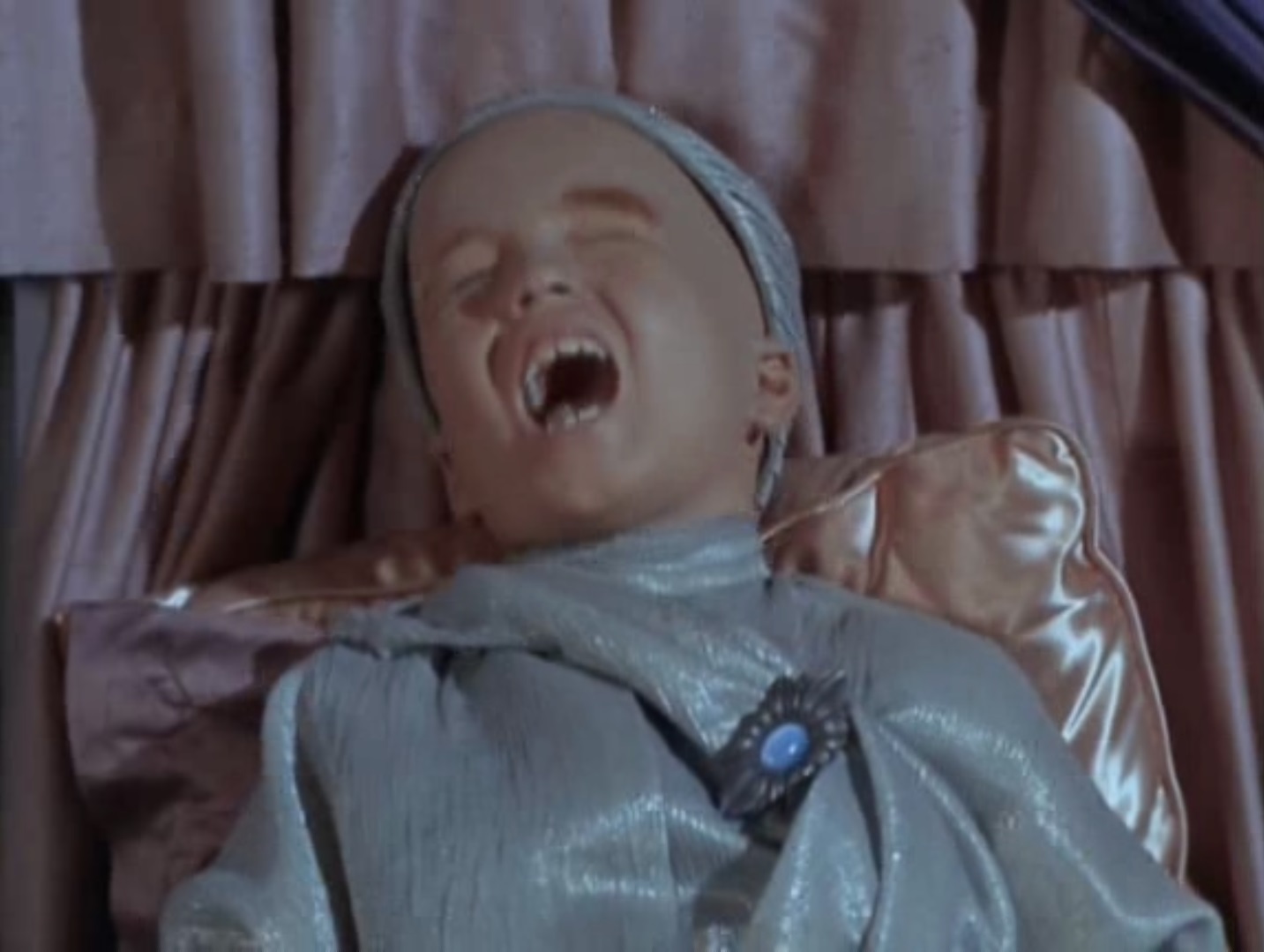
"Just kidding!"
Lieutenant Bailey's interactions with the captain rang an odd note in the episode. Kirk's "tough love" attitude toward him reminded me strongly of the captain in "The Bedford Incident", and I kept half-expecting Bailey to fire the ship's 'phasers' when he wasn't supposed to (instead he did the opposite, freezing in the moment of crisis).
I do want to make several notes about special effects. First, the lights making up alien ships were extremely effective (and I understand these effects were so involved that they delayed the release of this episode, which was meant to be much earlier in the line up). Second, the figure of Commander Balock that appeared on the Enterprise’s screen was an unconvincing one, yet it was plausible enough for our generation — after all, we were raised on puppet shows and other primitive special effects. The fact that the episode’s writer subverted these expectations and made the figure an actual puppet was absolutely ingenious. And third, the best special effect in the entire show had to be the dubbing of little Clint Howard with an adult’s voice.
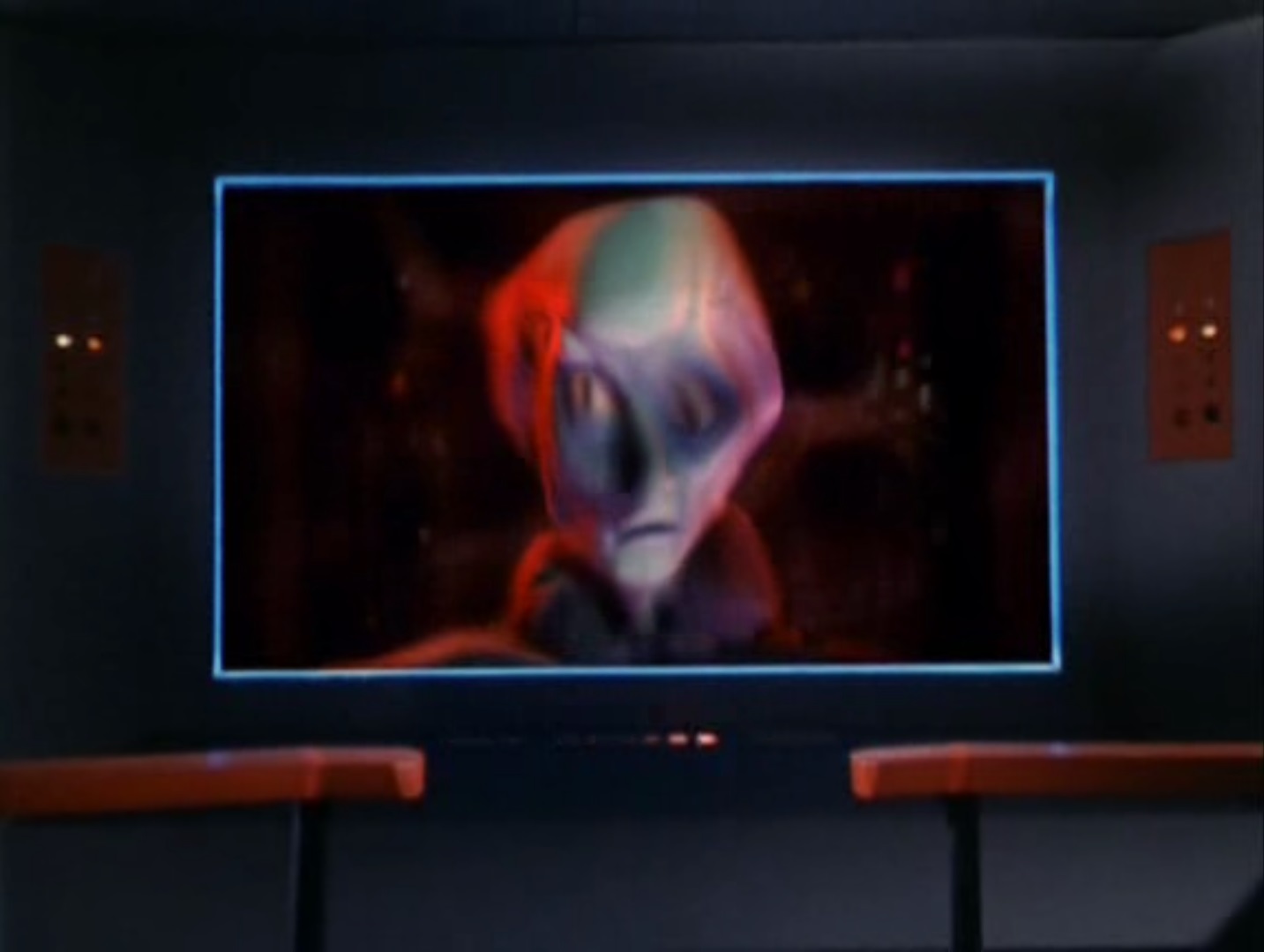
"You Have Two Minutes Until Howdy Doody Time!"
3 stars, for the special effects, the cleverness, and the banter.
Off Kilter

by Lorelei Marcus
I enjoyed the overall message of "The Corbomite Maneuver", but I felt the episode had to make some sacrifices to get there. In particular, the atmosphere of the ship and everyone's characterizations were severely altered from what we've seen thus far. Captain Kirk seemed forced into the role of the hard-edged, authoritarian Captain. The women of the crew were more stereotypically portrayed, pushed aside even, so that the men could have their dramatic moments. Uhura looks bored. Yeoman Rand exists to make coffee and salad and annoy Captain Kirk by being a woman. All in all, the Enterprise felt much more current-day Navy in portrayal, and more militaristic in character.
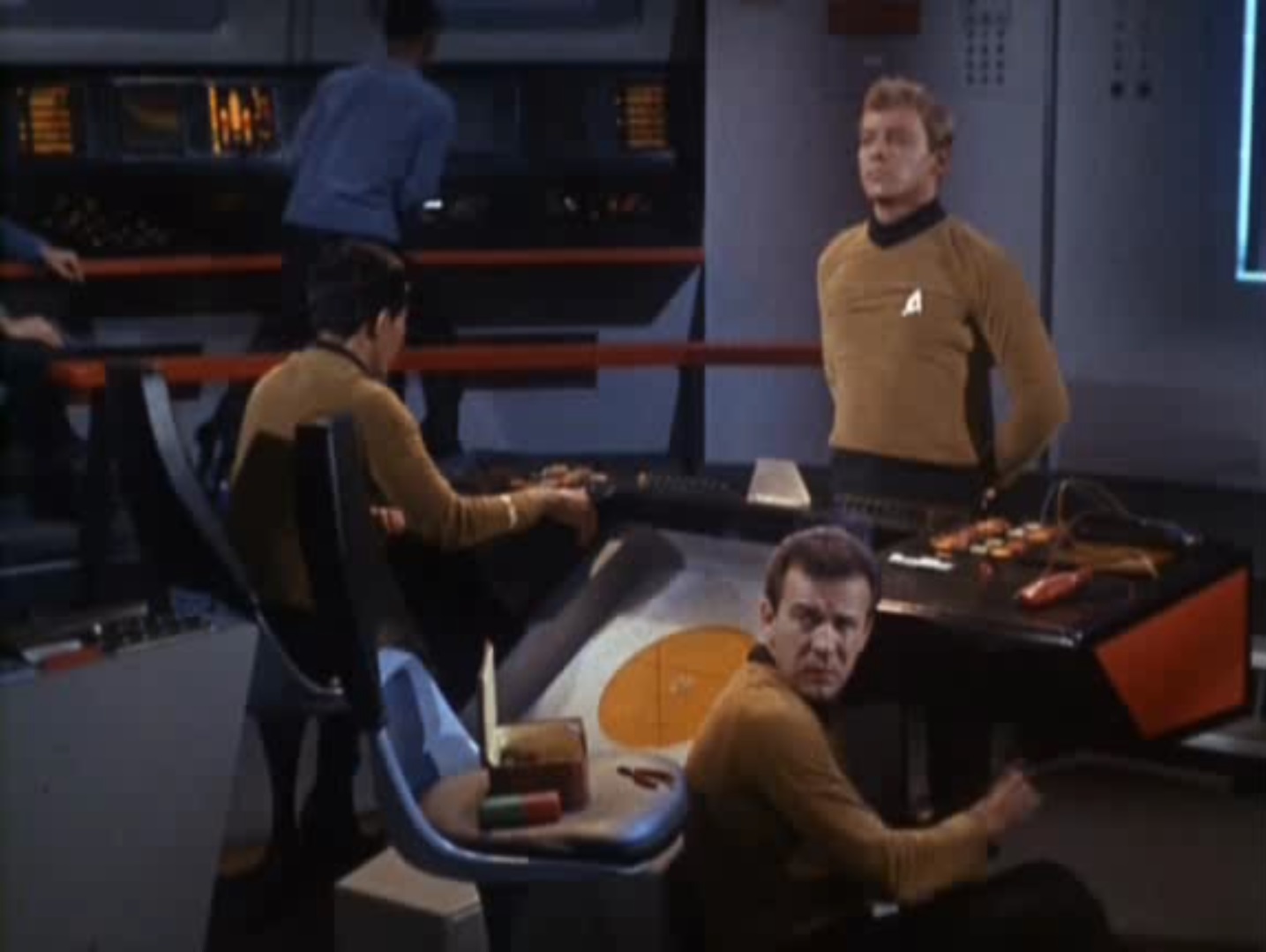
"Did I say 'at ease', mister?"
The special effects were, as has been noted, a cut above. But I would have liked to have seen this story told with the same Enterprise we're coming to know and love, rather than this odd, warped one, seemingly created to fit the plot's needs.
With a mid-tier story, great visuals, and inconsistent characterization, I give "Corbomite" three stars.

by Jessica Dickinson Goodman
A Different Kind of Man Behind the Curtain
When I first heard Balok speak in this week’s episode, his voice reminded me of Frank Morgan’s booming performance in The Wizard of Oz (1939). The imagery and tactics reminded me of it as well: flowing curtains of light cascaded over Balok’s alien face, the crew of the Enterprise scrambling to bargain and trick their way out of the crisis as a seemingly all-powerful wizard holding hapless visitors to arbitrary and impossible rules.
When we found that, like The Great and Powerful Oz, Balok was a small man, pulling puppet strings to intimidate and test those around him, the twist felt familiar. But that moment was also where these two fantasies diverged: where the Wizard is venal and greedy, Balok is confident and curious. He is not a huckster, but a representative of a technologically-advanced society, able to control a vast space edifice from his tiny ship, and interested in learning the truth about the crew of the Enterprise.
While Dorothy, the Scarecrow, the Lion, and the Tin Man beg the Wizard to make them whole and take them home, Kirk, McCoy and Bailey don’t need any such boons from Balok. But he offers them anyway, opening up the possibility of cultural exchange between his First Federation and Kirk’s crew. Bailey, who had spent most of the episode as a cowardly lion, gracefully agrees to the exchange as the episode closes.
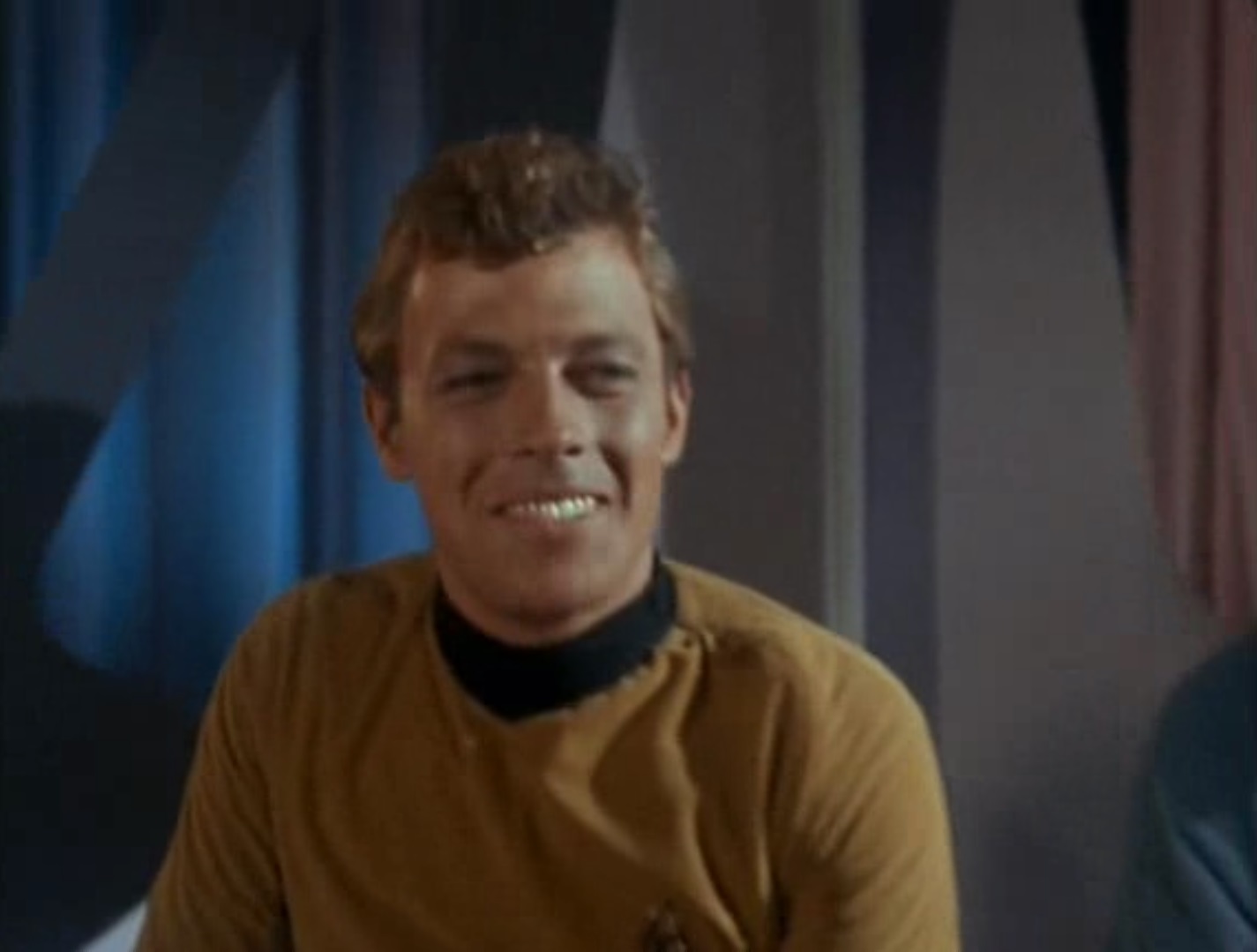
"We're off to see the Wizard!"
The parallels are not perfect — though if Mr.Spock had filled out the boarding party in the role of the Tin Man seeking a heart he already has, it might have been — but they are productive. Like the friends of Dorothy, Bailey, McCoy, and Spock spend the episode trying to free themselves from traps and get what they think they need. And like the Scarecrow, the Lion, and the Tin Man, in the end, the powers they were seeking to work around were not what they seemed.
I liked that, in this case, the powers were greater. Perhaps, if Balok had been behind the curtain in Oz, Dorothy and company would have gotten more than toys, but the true connection and understanding they needed in their journeys. I hope that future episodes are more even in tone, but also that they continue to expand our views of the universe the way Balok will for Bailey.
Three stars.



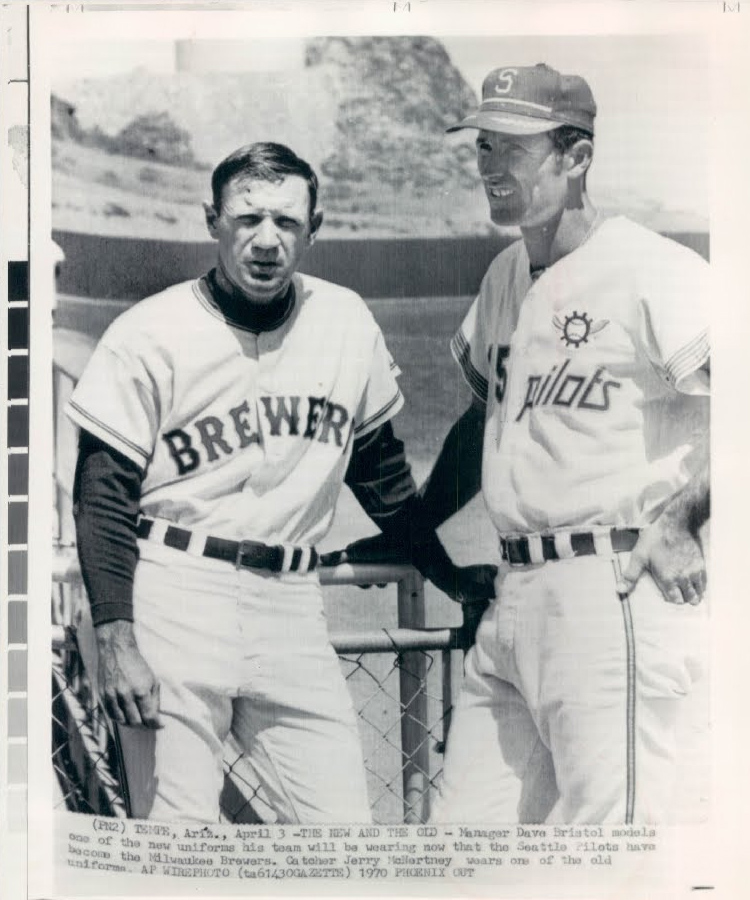

![[April 12, 1970] And What Happens When the Machines Take Over? (Colossus: the Forbin Project)](https://galacticjourney.org/wp-content/uploads/2025/04/colossus4-672x372.jpg)
![[November 14, 1966] <i>Star Trek</i>: "The Corbomite Maneuver"](https://galacticjourney.org/wp-content/uploads/2021/11/661114title-672x372.jpg)












